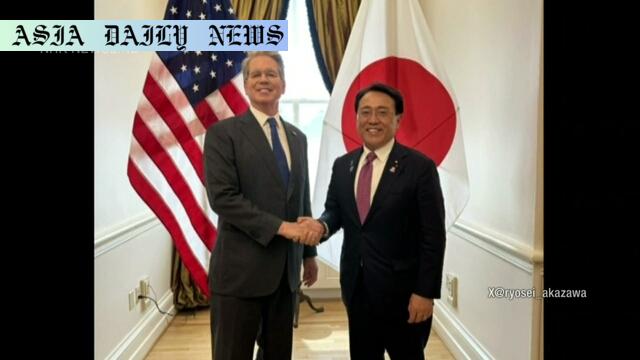Negotiations: Japan and US officials discuss trade expansion, non-tariff measures, and economic security before the G7 summit.
- Japan’s Akazawa Ryosei met US officials to discuss trade and security.
- Talks focused on creating a mutually beneficial agreement pre-G7.
- Economic revitalization and non-tariff measures were key topics.

Deepening US-Japan Trade Relations
Japan’s chief tariff negotiator, Akazawa Ryosei, has made significant strides in engaging US officials on critical trade issues ahead of the influential Group of Seven (G7) summit. On his Washington visit, Akazawa held discussions with US Treasury Secretary Scott Bessent and Commerce Secretary Howard Lutnick. These talks marked another chapter in strengthening the countries’ economic relationship, highlighting their collaborative efforts to address trade expansion, non-tariff barriers, and economic security concerns. With Akazawa serving as Japan’s economic revitalization minister, his leadership underscores Tokyo’s commitment to supporting multipronged collaboration in commerce and revitalization frameworks.
Setting the Stage for Multilateral Success
The timing of the meeting is critical, with Japan’s and the United States’ leaders set to meet during the upcoming G7 summit. Akazawa emphasized the importance of aligning international collaboration strategies before these high-level gatherings. Utilizing the precedents set during prior phone negotiations between both nations’ leaders, these Washington discussions delved into previously identified goals. According to Akazawa, both parties sought concrete solutions that would balance US-Japan interests, focusing on areas ranging from market growth to ensuring seamless economic cooperation.
Challenges on the Horizon
Despite the progress, Akazawa was candid in his remarks to reporters regarding the complexities of the negotiation process. Drawing an analogy of a “fog” that may or may not clear, the minister underscored the uncertainty surrounding comprehensive trade deals. He carefully avoided speculation on particular outcomes to avoid creating unrealistic expectations or concerns. This cautious stance reflects the challenges inherent in finalizing high-stakes international agreements, where every detail must be meticulously scrutinized. By maintaining flexibility and patience, Japan continues to navigate through the multifaceted nature of bilateral trade progress.
A Shared Vision for Economic Growth
Moving forward, Akazawa iterated Japan’s dedication to prioritizing these talks, focusing on creating equitable economic opportunities. Both sides are determined to strike an agreement that benefits their economies while preserving long-term partnerships. The emphasis on economic security and addressing non-tariff measures further sheds light on Japan’s intention to go beyond traditional trade negotiations, enhancing overall cooperation frameworks. Akazawa’s remarks suggest that while challenges persist, the shared vision of growth and innovation can catalyze success in the coming weeks.



Commentary
The Importance of Timing in Trade Talks
Timing is everything in high-level negotiations, and Japan’s decision to engage with the United States before the G7 summit highlights their awareness of global optics and policy influence. The symbolic nature of these discussions prior to such a critical multilateral forum illustrates a commitment to showing progress on the world stage. Strengthening economic ties with the US sets the stage for Japan to emerge as a significant player in international trade discussions, ensuring its voice is heard among other global powers.
Balancing Pragmatism with Optimism
Akazawa’s cautious optimism in describing the negotiations is a poignant strategy. By drawing a line between hope for resolution and realistic expectations, he manages to communicate progress without overpromising. This approach is practical and avoids political fallout if talks are delayed or goals unmet. His analogy of the “fog” serves not only as a metaphor for the negotiation’s uncertain trajectory but also reflects patience and a recognition of the complexities inherent in global trade agreements.
A Blueprint for Future Cooperation
The focus on non-tariff measures and economic security signals that Japan and the US aim to expand their collaboration beyond standard trade frameworks. This forward-thinking approach could be a template for other economies seeking partnership models that transcend goods exchange. For Japan, creating a roadmap that includes long-term innovation and security partnerships is crucial. It reflects their acknowledgment of the shifting dynamics of global economies, where cooperation increasingly hinges on innovation and strategic security measures rather than traditional tariff-focused discussions alone.